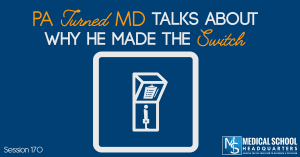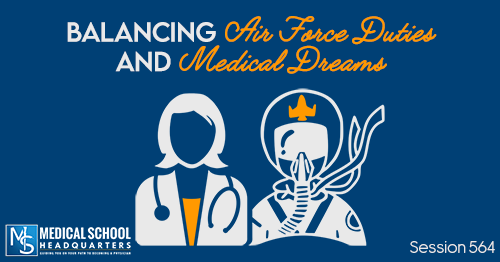Apple Podcasts | Google Podcasts
Session 170
 In this episode, Ryan talks with Brad, a nontraditional student who comes from the PA world and is now a first year medical student. Today, Brad shares about his amazing journey, why he decided to take the PA route and then finally decide to switch his path to medical school.
In this episode, Ryan talks with Brad, a nontraditional student who comes from the PA world and is now a first year medical student. Today, Brad shares about his amazing journey, why he decided to take the PA route and then finally decide to switch his path to medical school.
Here are the highlights of the conversation with Brad:
When Brad decided to become a physician:
- Wanting to be a physician as a young boy
- In undergrad, he took the Emergency Medicine Program
- A year after college. he went to PA school
- Realizing he was not fulfilled so decided to go to medical school
- Brad worked as PA for 5 years
Take the PA route if you:
- Enjoy clinical medicine
- Are okay not always being a top dog
- Are okay not having the physiological and pathological “why’s” to what’s going on with your patient
[Related episode: MD vs PA! Let’s Talk About It With a PA to Help You Decide]
Why he still wanted to be a doctor, even after becoming a PA:
- Having the desire to know more “why” about what’s going on with the patients
- Having the full experience
- When he wanted to start a system-based program, it requires a physician champion to get it going and spearhead it
Factors that got Brad derailed from premed the first time:
- Realizing he had to take classes or a semester in Physics and organic chemistry
- Getting a D in organic chemistry the first time, an F the 2nd time, and an A the 3rd time
- Getting a C- in physics the first time, a W the 2nd time, and an A the 3rd time
- Working at night while going to school in 2007
The differences between PA and physician:
- In the urgent care center, there is no physician on site but just electronic communication with them. The PA takes care of the patients.
- If you want to come up with a treatment plan, you need to be a physician to back up your point of view.
- As a PA, you’re not the one leading the surgery or making final decisions on rounds in the ICU.
- If you want to be heavily involved in patient care, procedures, and being clinically confident and more in charge, go to medical school.
- The supervising physician is the overarching leader at the end of the day.
Benefits of becoming a physician assistant:
- Exposure to the whole gamut of patients
- No limitation on patient care depending on the kind of job you seek out
- 2 years of school
Steps Brad took to succeed in his medical school application:
- Having a mentor
- Contacting the admissions office occasionally
- Forming relationships with admissions committees
[Related episode: Should I Meet With Admissions Committees Before I Apply?]
How many medical schools did he apply to?
- Applying within the New York, New Jersey, Pennsylvania, Connecticut area and Pittsburgh
- Applying to 25-30 medical schools
[Related post: How Many Medical Schools Should I Apply To?]
Brad’s path to a medical school acceptance:
- Applying early decision and getting nothing
- Applying to DO schools
- Getting placed on the waitlist
- Sending a letter of intent every two months to update the school
- Getting a call by the end of June
Some pieces of advice for premed students:
If you truly, in your heart, want to be a physician and that is your path, that is your destiny, then you will always want to be a physician, no matter what you do. It’s not going to go away.
Form relationships. Meet everybody. There are thousands of people applying to medical school. Unless you make yourself known, you’re a number.
Stay persistent if you really want to be a physician. Send update letters. Meet people on the admissions committees and form relationships with them.
If you truly, in your heart, want to be a physician and that is your path, that is your destiny, then you will always want to be a physician, no matter what you do. It's not going to go away.Click To TweetLinks and Other Resources:
- Related episode: MD vs PA! Let’s Talk About It With a PA to Help You Decide
- Related episode: Concerns About Transitioning From PA to MD/DO
- Blueprint MCAT (formerly Next Step Test Prep): Get one-on-one tutoring for the MCAT to maximize your score. Use promo code “MSHQ” to get $50 off their tutoring programs or course!











